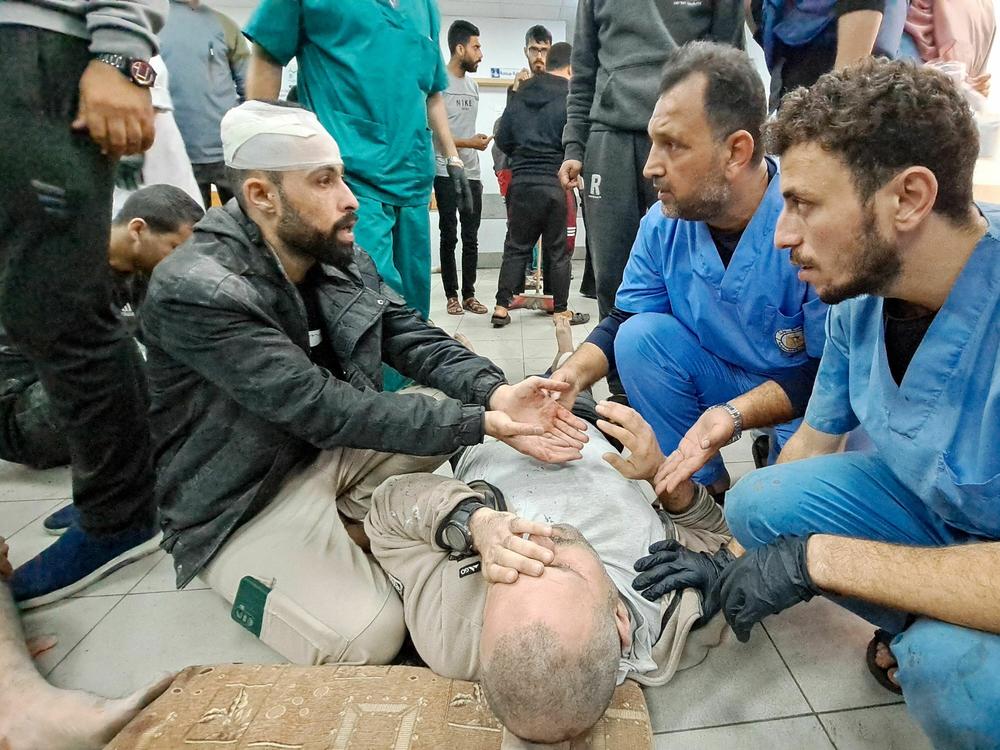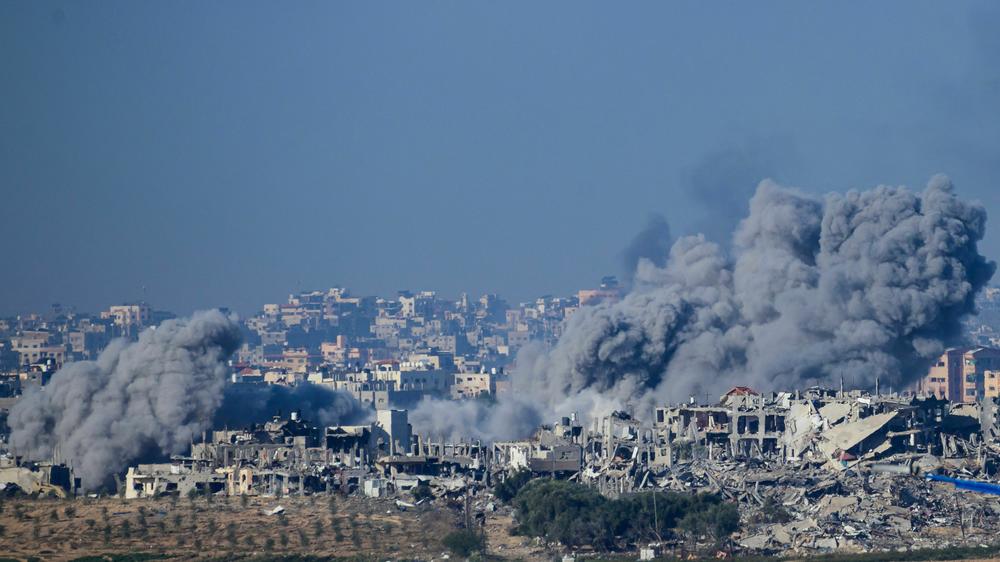Section Branding
Header Content
Qatar says Israel and Hamas agree to a cease-fire deal to free some hostages
Primary Content
Updated November 21, 2023 at 11:55 PM ET
TEL AVIV, Israel — Israel and Hamas have agreed to a four-day pause in fighting to allow the release of 50 women and children being held by militants in Gaza, according to a statement from the Qatari foreign ministry.
Qatar, which has mediated talks that have gone on for weeks, said Israel has agreed to release "a number" of Palestinian women and children being held in Israeli prisons. Earlier reports stated Hamas was seeking the release of about 150 prisoners.
The announcement, in a tweet from Qatar's Ministry of Foreign Affairs, said the starting time of the pause will be announced in the next 24 hours. The announcement came after the Israeli government announced it had approved a deal for the pause in fighting to facilitate the release of "at least 50" of the approximately 240 hostages seized by Hamas in its deadly attack on Israel on Oct. 7.
The Qatari government statement also said that the agreement would allow the entry into Gaza of "humanitarian convoys" including relief aid and fuel.
In a statement late Tuesday night, President Biden said he and first lady Jill Biden welcomed the announcement. He thanked Sheikh Tamim bin Hamad Al-Thani of Qatar and President Abdel-Fattah El-Sisi of Egypt for their roles in helping broker the announcement.
"Jill and I have been keeping all those held hostage and their loved ones close to our hearts these many weeks, and I am extraordinarily gratified that some of these brave souls, who have endured weeks of captivity and an unspeakable ordeal, will be reunited with their families once this deal is fully implemented."
Media reports earlier Tuesday said the deal was expected to include Israel's release of a number of Palestinian prisoners in Israeli jails. Israel did not mention a prisoner release in its government statement.
Israel's statement said it approved an "outline" for the release of at least 50 women and children who were abducted in the Hamas attack Oct. 7. The Israeli statement said that after the initial four-day period, Israel would be willing to extend the "pause" in hostilities one more day for every 10 additional hostages Hamas released.
The statement made clear that the fighting is not over, adding that Israel "will continue the war in order to return home all of the hostages, complete the elimination of Hamas and ensure that there will be no new threat to the State of Israel from Gaza."
Speaking with families of the hostages on Monday, Israeli Prime Minister Benjamin Netanyahu said that returning their loved ones is a "holy and supreme mission."
Netanyahu called the hostage/prisoner exchange deal a "hard decision but right decision."
He added that all of Israel's security institutions, such as the Israeli military and Mossad spy agency, support the deal.
Netanyahu's comments came hours after the Doha-based Hamas chief Ismail Haniyeh said the two sides were "close to reaching a truce agreement" with Israel.
Some 13,000 people in Gaza, which is run by Hamas, have been killed by Israeli attacks since the war began, according to Palestinian health officials.
Americans could be among those released
There are three Americans who could be released under the deal, including a 3-year-old whose parents were killed on Oct. 7, according to a senior U.S. administration official.
The official added that the deal is structured so that the pause in fighting would be extended if additional people are released beyond the first 50.
There are 10 Americans unaccounted for in total, the official said, though they would not confirm if they are being held by Hamas.
Pressure was growing for Israel to act on hostages
Public support for a deal in Israel had been building and there have been large demonstrations in support of the hostages, increasing pressure on Netanyahu's government to win their release.
The International Committee of the Red Cross said in a statement late Monday that its president, Mirjana Spoljaric, had met with Haniyeh in Qatar, calling for "the immediate release of hostages."
"The ICRC is insisting that our teams be allowed to visit the hostages to check on their welfare and deliver medications, and for the hostages to be able to communicate with their families," the aid group said, adding that as a humanitarian intermediary, it "does not take part in negotiations leading to the release of hostages."
Israeli strikes on Gaza continued
Earlier, fighting continued around a hospital in northern Gaza that was hit by shelling on Monday, killing at least 12 people, according to Gaza's health ministry. NPR was unable to independently verify the casualties at the Indonesian Hospital. Israel's military says its forces were fired on from within the hospital and that it returned fire, but that "no shells were fired toward the hospital."
Displaced civilians and medical staff are trapped in the hospital, as Israeli troops battle Hamas fighters in the area.
Israel, which insists that Hamas is using hospitals in Gaza as covert command posts, has received international criticism for attacks that have hit the medical facilities.
Speaking to NPR, Medhat Abbas, a doctor at the Indonesian Hospital, said about 120 people were evacuated from the facility to Nasser Hospital in the south of Gaza. Gaza's health ministry says at least 500 wounded people and more than 2,000 displaced Gaza residents remain stranded inside.
"Anyone who does not die from Israeli bombing dies from bleeding because he does not reach the hospital," the Gaza health ministry said. A spokesman said the occupancy at hospitals in Gaza has reached 190%.
In a status report on Tuesday, the United Nations Office for the Coordination of Humanitarian Affairs said Monday's attack on the Indonesian Hospital marked the fifth time the facility had been hit since the start of hostilities.
"This health facility is under an electrical power (blackout) due to lack of fuel and it also faces severe shortages of water, essential medicines and supplies."
Earlier this week, Israel's military released video it said proved that Hamas had used Gaza's largest hospital, Al-Shifa, as a covert base. Al-Shifa was badly damaged and its electricity cut off during Israeli operations to capture the facility. On Monday, 28 premature newborn babies were evacuated from Al-Shifa and transported to hospitals in Egypt for treatment.
Aid groups renew calls for food assistance, fuel
In a post on X, formerly Twitter, on Tuesday, the U.N. World Food Program said Gaza's 2.2 million people are in urgent need of food assistance.
"Existing food systems are collapsing, and to reach those in need, WFP and our partners need increased access and resource like fuel, gas, and connectivity. To make a real impact, we need hostilities to halt."
Last week, the U.N. World Food Program warned that Gaza was facing widespread hunger as a result of the conflict. "[N]early the entire population is in desperate need of food assistance," it said in a statement.
"With winter fast approaching, unsafe and overcrowded shelters, and the lack of clean water, civilians are facing the immediate possibility of starvation," WFP Executive Director Cindy McCain said, adding that the needs of Gazans could not be properly met with a single border crossing at Rafah, Egypt.
"The only hope is opening another [crossing], safe passage for humanitarian access to bring life-saving food into Gaza," McCain said.
NPR's Ruth Sherlock in Rome contributed to this report.
Copyright 2023 NPR. To see more, visit https://www.npr.org.
Bottom Content





